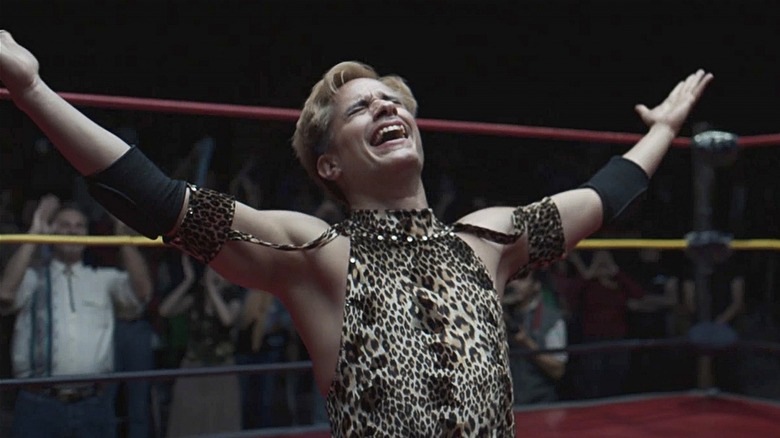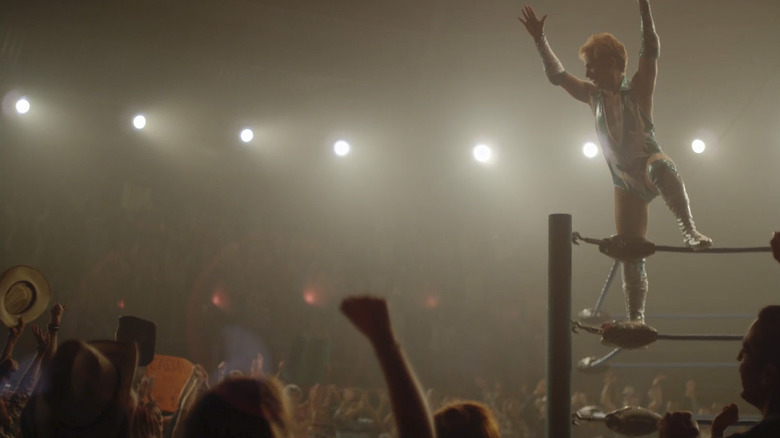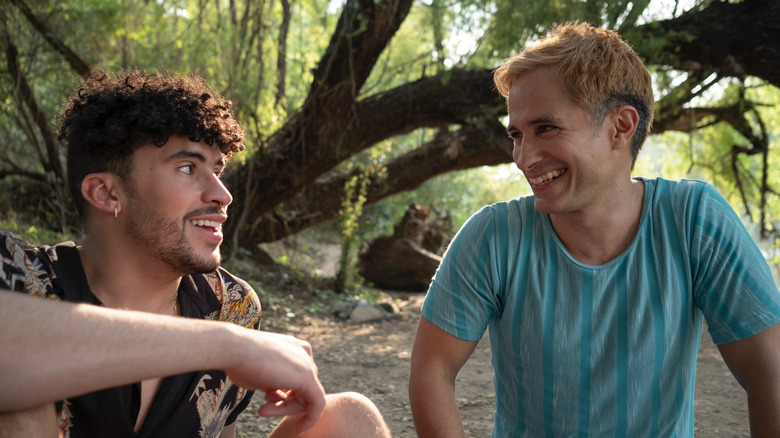Cassandro Review: An Entertaining Underdog Story - But Not Quite A Knockout
- Perfectly outlines why its hero was so groundbreaking without being naive enough to claim he changed the world
- It's hard to imagine anybody other than Bernal in the lead role ...
- ... Even though he is, as a 44-year-old actor, incredibly miscast as someone more than 20 years his junior
Can an actor be perfectly suited to a role and still be open to the criticism that they've been miscast? That's certainly the case with "Cassandro," a lively biopic of a gay wrestler who challenged the homophobic attitudes of the hyper-masculine world of Lucha Libre. Don't worry, this isn't going to be a tiresome complaint about whether heterosexual lead actor Gael García Bernal is suited to play a character with a different sexuality to his own — his stellar performances in the likes of Alfonso Cuaron's "Y Tu Mama Tambien" and Pedro Almodovar's "Bad Education" should have put to bed any discourse over whether straight actors should be allowed to play gay years ago. Instead, the major concern over his casting in documentary filmmaker Roger Ross Williams' narrative debut is a reoccurring one across the biopic genre.
When it comes to finding larger-than-life figures from the real world, actors rarely stop to consider whether these roles are age-appropriate; it's why Oscar season is typically littered with A-listers buried beneath prosthetics to play characters much older than them. While nobody would dare claim the dashing 44-year-old star hasn't maintained a youthful look into middle age, it's still a stretch to imagine him as a young adult.
A miscast role that couldn't be played by anyone else
Saúl Armendáriz, the wrestler behind the Cassandro persona, was just 18 years old when he first entered the ring and garnered attention, the period when this adaptation of his life story begins. When played by Gael García Bernal, I have a feeling many viewers will be creating a backstory of their own for this character: a struggling wrestler, getting nowhere later in life, still living with his mom as he's struggling to get by. It takes a moment to realize the main reason he still lives in the parental home and hasn't had much fighting experience, is because he's barely an adult to begin with.
This may be distracting throughout, but not to the extent that it detracts from the exploration of a sports culture largely unknown outside of Latino communities. We're introduced to Saúl, a young El Paso native who frequently crosses the border to participate in wrestling matches, before he enters the ring for another defeat. His passion is wrestling, but because of his body type, promoters will never let him win for fear of upsetting their predominantly male audience. He wrestles under the uninspired moniker El Topo, but after he begins training with Sabrina ("A League of Their Own" star Roberta Colindrez) he starts fleshing out a new character: Cassandro. In the world of Lucha Libre, fighters known as "exótico" — typically flamboyant gay stereotypes, who fight in drag — are brought in as opponents to the major Luchadors, figures that the straight men watching won't have any concerns rooting against. Cassandro is designed as the first exótico who can beat their opponents, even if it means upsetting armies of fans along the way.
Roger Ross Williams' film does a better job than many other sports biopics at contextualizing why their subject was so groundbreaking in their field in a way that isn't just catering towards newcomers, or offering empty nostalgia to viewers who grew up watching Lucha Libre. In the way this film tells the story, the existence of exótico, for example, has normalized a non-violent form of homophobia that it's not exactly easy to look back upon fondly. Nobody is ever violent to Saúl outside the ring, because they can air their grievances at him while he's fighting — the darkest gag in the movie might be hearing crowds go from chanting the F-slur as an insult, to using it as a term of endearment when he's risen the ranks and become a major celebrity.
An underdog tale with only small victories
Rather than suggesting Cassandro helped pave the way for greater acceptance of gay people in popular culture, the film finds its power in addressing any queer celebrity's limitations when it comes to pushing homophobia back into the closet altogether. For every powerful scene where he is told by a fan that he's inspired them to come out to an accepting family, there are several with minor characters we overhear dismissing Saúl for his sexuality long after he's become a household name. This is the case with any LGBTQ public figure who breaks barriers, but it's refreshing to see a movie directly acknowledge that, for all our achievements, there will always be a ceiling on how much we can get the wider world to accept us for who we are, rather than approach this subject with a naive sense that one person can change all attitudes for the better.
Admittedly, most viewers won't be walking away from "Cassandro" with their pessimism reaffirmed like I did, largely because its many delights don't require any introspection. There are simple pleasures of seeing Gael García Bernal transform into the larger-than-life exótico, leaning into gay sexual stereotypes during his fights in the ring only to subvert them; fighting positions designed to mimic gay sex, for example, are transformed from visual jokes to highlight a Luchador's supposed femininity to a source of strength. Every time Cassandro bends over in a flirtatious way, it's to lure his opponent into a trap — not only does the fight choreography offer the viewer fun visual gags, but it also offers simple shorthand about why what a rival might perceive as a ludicrous weakness is easily his biggest strength. It's strange to say, considering that these are the moments where the character very consciously leans into oversized stereotypes, but these fight sequences are the most empowering in the movie, and it all hinges on Bernal's assured timing as a physical comedian.
There are moments in "Cassandro" which start to sag — his affair with a closeted Luchador played by Raúl Castillo isn't as intriguing a dissection of society's internalized homophobia as what we see from out on the ring — but thanks to Bernal's lead performance, it's as gripping as the best underdog sports stories. To return to the question that opened the review, yes, Bernal is drastically miscast, but after watching the movie, I can't imagine this character brought to life by anyone other than him.
"Cassandro" is in limited release from Friday, September 15, and streams on Prime Video from Friday, September 22.
This piece was written during the 2023 WGA and SAG-AFTRA strikes. Without the labor of the writers and actors currently on strike, the movie being covered here wouldn't exist.


